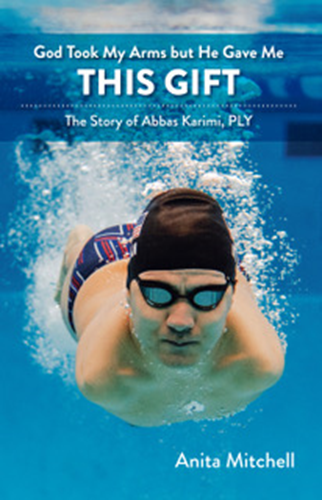Welcome home, Abbas Karimi. Read about him in Anita Mitchell's book, and in this interview we did before the Paralympic games.
WSVN did this story Sunday. Click on his name to get there
Back in March, I interviewed Anita Mitchell about her amazing book on the Paralympic swimmer Abbas Karimi, who has no arms. I'm happy to report he has win two Silver Medals for Team USA.
Abbas Click here for an update.
10 Questions for Anita Mitchell, whose new book came out April 17. It's the incredible true story of a man born without arms who became a champion swimmer. Click on the link to buy at Amazon.
God Took My Arms But He Gave Me This Gift
BRIEF SYNOPSIS OF THE BOOK: The future looked bleak for Abbas when
he was born. With so many other problems in Kabul, people with disabilities are
a low priority. If Abbas wanted to excel with his unusual skill as a swimmer,
he knew that he had to leave his large and close family. How he left, how he
traveled through Iran, how he petitioned the UNHCR to come to the United
States, how he made the Tokyo refugee Paralympic team. How he became a US
citizen and what complications ensued in his life is a beacon of triumph and a
salute to the human spirit. Abbas is a role model not only for people
with disabilities, but he is also a role model for anyone with a lofty goal
that comes with detours along the way.
WHAT DOES THE TITLE “GOD TOOK MY ARMS BUT HE GAVE ME
THIS GIFT” MEAN? When I first did a short blog piece about Abbas, he told
me this line and I said, "Abbas, that could be the title of your
book”…and it is. Abbas is an observant Shiite Muslim and although he was born
without arms, he believes that he was given the gift of becoming a swimmer.
HOW CAN SOMEONE WITHOUT ARMS BECOME A SWIMMER? Abbas
was soothed by the water as a kid growing up in Kabul. He says he is reborn
every time he swims. Strength in swimming comes from abdominals and
legs..and mostly from your desire to do it. Although Abbas was born without
arms, through expert professional coaching, he has learned how to propel
through the water at a championship level. A winning mentality is something
Abbas always had, whether it was how he played marbles, performed
martial arts or eventually excelled to world class levels in Paralympic
swimming.
WHERE DID THIS STORY COME FROM? I am also a member of
Swim Fort Lauderdale (SFTL) masters swim team . In our weekly
newsletters from Coach Marty Hendrick, he told the team that we were getting a
new swimmer. This new swimmer was training for the Tokyo Paralympics,. He was
coming from Portland Oregon where he had lived and trained for four years..
Abbas was brought to the United States by the United Nations High
Commissioner for Refugees (UNHCR). He was from Kabul, Afghanistan and
spoke very good English . He lived in Turkish refugee camps before being chosen
to emigrate to the United States.
I had just retired from 26 years at
WSVN7 as a field producer and assignment editor. I knew that this was
an incredible story. I underestimated just how special this story
and this person is.
BRIEF SYNOPSIS OF THE BOOK: The future looked bleak for
Abbas when he was born. With so many other problems in Kabul, people with
disabilities are a low priority. If Abbas wanted to excel with his unusual
skill as a swimmer, he knew that he had to leave his large and close family.
How he left, how he traveled through Iran, How he petitioned the UNHCR to come
to the United States, how he made the Tokyo refugee Paralympic team. how he
became a US citizen and what complications ensued in his life is a beacon
of triumph and a salute to the human spirit. Abbas is a role model not
only for people with disabilities, he is a role model for anyone with a lofty
goal that comes with detours along the way.
WHAT ARE THE PARALYMPICS: The Paralympic Games are a
series of multisport events with disabled athletes. The games are held
immediately following the Olympic Games in the same host city.
WHAT IS YOUR BACKGROUND: I have been a Broward County
high school English teacher, a field producer/assignment editor at WSVN7,
a blogger, a book editor and now an author. I graduated from Michigan
State University.
ADVICE FOR THOSE STARTING THEIR LITERARY CAREERS
Write whatever you can that people will see; you never know where
that will lead. Keep writing what you love every day: you will get better
and faster. I have written restaurant menus, event programs,
wedding toasts….anything that let people know that I write. Through this, I was
approached about this book
WHERE CAN THE BOOK BE PURCHASED? Amazon.com, soon Barnes&Noble
WHAT I DO WHEN I AM NOT WRITING I am swimming,
training in the gym for better swimming, cruising garage sales, talking to
people who are important to me and relaxing at my keyboard with my cat.






